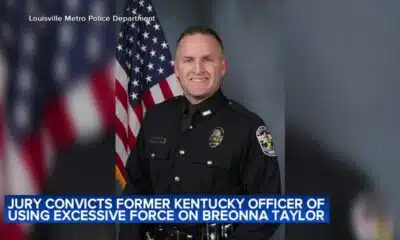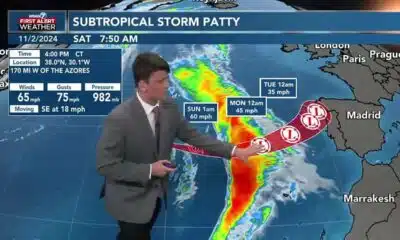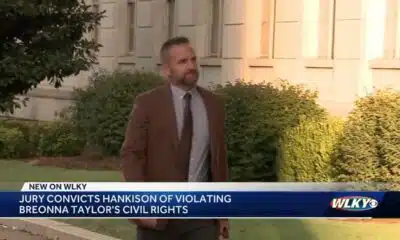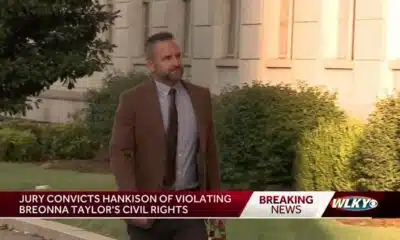Mississippi News
‘The Movement Made Us’: Father and son reflect on past
In ‘The Movement Made Us,’ father and son reflect on the past, both remembered and forgotten
David Dennis Jr. grew up with two versions of David Dennis Sr.: one, an activist at the very center of the civil rights movement who skirted death countless times; the other, his father, the man whose approval and attention he desperately wanted.
He remembers wondering as a child how his father “could fight for strangers while the people you said you loved the most fell apart,” he described in a letter written to his dad.

It was only through writing “The Movement Made Us: A Father, a Son, and the Legacy of a Freedom Ride” that Dennis Jr. was able to fully reconcile the two.
“(Writing this book) really brought the two together and helped me understand how one informed the other, and how both created this complete person who led to me, and then to my kids, and all of that,” Dennis said in an interview with Mississippi Today.
“The Movement Made Us” is at once historical and intimately personal – the story is of a father and son, through whom the reader gets a glimpse into an entire lineage. It is also a deeply moving account of the civil rights movement in the South by a man who was in the eye of every storm: the Freedom Rides, Freedom Summer, the murder of Medgar Evers and the Harlem riot of 1964.
The book begins with his father as a college student at Dillard University in New Orleans who was initially more interested in ensuring he got his degree and dating an attractive activist than protesting and being arrested. That changed at a meeting following attacks on Freedom Riders in Anniston and Birmingham who were traveling the South in protest of segregation on buses. The meeting was to discuss whether the rides would continue and was attended by Martin Luther King Jr., John Lewis, Andrew Young and other civil rights giants.
It was there that Dennis Sr. heard something that changed the trajectory of his life forever: “Okay, now make your choice, because there’s not enough space in this room for both God and fear.”
After that, all hesitation fell away: he was wholly and completely dedicated to the Movement.
Dennis Sr. went on to serve as field secretary for the Congress of Racial Equality (CORE) in Louisiana and Mississippi from 1961 through 1965 and as co-director with Bob Moses of the Voter Education Committee of the Council of Federated Organizations. He was part of organizing the Mississippi Freedom Democratic Party and worked with Fannie Lou Hamer, Medgar Evers and James Cheney.
He helped find Hamer safety and care after she, along with other activists, were brutally beaten in the Winona jail. He delivered Evers’ eulogy and, if not for a bout of bronchitis, would have been the fourth passenger in the car with Cheney, Andrew Goodman and Michael Schwerner that fatal night in Neshoba County.
Dennis Jr. writes his father’s stories as if his father were telling them himself – he successfully uses in-depth interviews with his father and other civil rights workers, CORE files and correspondence and historical research to write an account that makes the readers feel as if they are Dennis Sr.’s very mind in the middle of these harrowing events.
He masterfully fills in gaps in his father’s memory in ways that are just as telling as if Dennis Sr. had remembered each detail. The two had planned to visit Bogalusa to revisit the stories of the Deacons for Defense and Justice and the site of Bloody Wednesday, but Dennis Sr. came down with a stomach ache before they left. Bloody Wednesday refers to the events of May 19, 1965, when a mob of white people joined by police officers attacked and brutalized Black men, women and children at whites-only Cassidy Park.
Dennis Jr. went without his dad and visited with the organizers and family members of the Deacons for Justice. Valeria Hicks, one of the Deacons, told him it was Dennis Sr. who had sent them to Cassidy Park to desegregate it, having no idea it would turn into a bloodbath.
“I know you’re reading this and laughing,” Dennis Jr. wrote in the letter to his dad in the book about his trip. “Because when I tried to tell you what Mrs. Hicks said, you said that calling for the people in Bogalusa to go to Cassidy Park was one of those memories that got closed away forever, and you still don’t remember doing it but ‘it sounds like something I would have done.’ You also swore your stomach ache came from something you ate or whatever. I believe you on both accounts.”
He goes on to write about the lesson he learned when writing the book: sometimes the forgotten parts of one’s past are just as important as the remembered.
“I’ve come to understand that your history is as much about what you don’t remember as it is about what you can recall with precise certainty,” Dennis Jr. writes in a letter to his father in the book. “… But you know that our bodies tell the stories our minds can’t.”

Letters from Dennis Jr. to his father and children are peppered in between his father’s stories. They offer insights into his relationship with his father and show the unsettling parallels between what Dennis Sr. lived through in the 1960s and the events of 2018, 2019 and 2020, during which the father and son were writing the book, and Dennis Jr., a journalist, was covering the murders of Black men like Ahmaud Arbery and the ensuing Black Lives Matter movement.
“It was the summer of 2020. The summer of reckoning. The summer of George Floyd and Breonna Taylor and Rayshard Brooks and the largest protest in American history. I was tearing myself apart trying to cover as much of the American terror as possible, traveling to Brunswick, Georgia, to get the story of Ahmaud Arbery and chronicling every police killing because I felt like it was my responsibility to save these lives that had already been taken from us. I was burning out, breaking down, and falling apart.”
At the same time, his father had gone off the grid. The killings of that year were too similar to the murders in the 1960s – it was more than he could take.
Dennis Sr. had seen the video of George Floyd, screaming that he couldn’t breathe and asking for his mother. He had spent years wondering how it was when Chaney and Evers and all the others had died. Now, he saw.
“I’m seeing how they died now, Davy. George Floyd cried for his damn momma. I can’t stop hearing him screaming … For the first time I watched what it was like for white folks to kill us slowly,” he told his son over the phone. “… I hadn’t even considered if Medgar or James screamed for their mommas. Now I can’t stop wondering if they did.”
Dennis Jr. said that was a very dark period for both him and his father.
“You can feel like nothing has changed – you can let that despair take over, and I was letting that happen,” he said.
The two “came out the other side,” though, he said. They finished the book, which has been met with well-deserved praise and described as incredibly timely and “one of the most important books about the Civil Rights Movement” by author Clint Smith.
Dennis Jr. and his father will return to Mississippi, the scene of so much of the book, to the Mississippi Book Festival Aug. 20. The father and son will join Dr. Leslie-Burl McLemore, a fellow civil rights activist and director of the Fannie Lou Hamer National Institute on Citizenship and Democracy at Jackson State University, for a panel moderated by Pamela Junior, director of the Two Mississippi Museums.
“It’s special because there’s so much that’s happened there, and so many of the people are still there,” he said. “… I’m hoping we can go back to Mississippi as often as possible. There’s so much soul and spirit in the book (and its characters), and you can feel it when you’re there.”
This article first appeared on Mississippi Today and is republished here under a Creative Commons license.
Mississippi News
Suspect in Charlie Kirk killing is charged with murder as prosecutor says DNA found on rifle trigger
SUMMARY: Tyler Robinson, 22, was charged with the murder of conservative figure Charlie Kirk, shot Sept. 10 at Utah Valley University. Robinson confessed via text to his partner and left a note expressing intent to kill Kirk, citing hatred. DNA linked Robinson to the rifle used. Prosecutors revealed Robinson planned the attack for over a week and targeted Kirk, a key conservative youth leader. Robinson’s political views shifted after dating a transgender man, causing family tensions. After the shooting, Robinson discarded evidence and urged his partner to delete texts. FBI investigates possible wider connections. Charges include murder with potential death penalty enhancements.
Read the full article
The post Suspect in Charlie Kirk killing is charged with murder as prosecutor says DNA found on rifle trigger appeared first on www.wjtv.com
Mississippi News
Suspect in Charlie Kirk assassination believed to have acted alone, says Utah governor
SUMMARY: Tyler Robinson, 22, was arrested for the targeted assassination of conservative activist Charlie Kirk in Orem, Utah. Authorities said Robinson had expressed opposition to Kirk’s views and indicated responsibility after the shooting. The attack occurred during a Turning Point USA event at Utah Valley University, where Kirk was shot once from a rooftop and later died in hospital. Engravings on bullets and chat messages helped link Robinson to the crime, which was captured on grim video. The killing sparked bipartisan condemnation amid rising political violence. President Trump announced Robinson’s arrest and plans to award Kirk the Presidential Medal of Freedom.
The post Suspect in Charlie Kirk assassination believed to have acted alone, says Utah governor appeared first on www.wjtv.com
Mississippi News
Americans mark the 24th anniversary of the 9/11 attacks with emotional ceremonies
SUMMARY: On the 24th anniversary of the 9/11 attacks, solemn ceremonies were held in New York, at the Pentagon, and in Shanksville to honor nearly 3,000 victims. Families shared personal remembrances, emphasizing ongoing grief and the importance of remembrance. Vice President JD Vance postponed his attendance to visit a recently assassinated activist’s family, adding tension to the day. President Trump spoke at the Pentagon, pledging never to forget and awarding the Presidential Medal of Freedom posthumously. The attacks’ global impact reshaped U.S. policy, leading to wars and extensive health care costs for victims. Efforts continue to finalize legal proceedings against the alleged plot mastermind.
The post Americans mark the 24th anniversary of the 9/11 attacks with emotional ceremonies appeared first on www.wcbi.com
-
News from the South - North Carolina News Feed6 days ago
What we know about Charlie Kirk shooting suspect, how he was caught
-
News from the South - North Carolina News Feed7 days ago
Federal hate crime charge sought in Charlotte stabbing | North Carolina
-
Our Mississippi Home5 days ago
Screech Owls – Small but Cute
-
News from the South - Arkansas News Feed6 days ago
NW Arkansas Championship expected to bring money to Rogers
-
News from the South - North Carolina News Feed7 days ago
Under pressure, some immigrants are leaving American dreams behind
-
News from the South - Florida News Feed7 days ago
CBS Miami highlights free mammogram program with mobile mammovan
-
Mississippi News Video7 days ago
Mississippi Science Fest showcases STEAM events, activities
-
News from the South - Tennessee News Feed6 days ago
What to know about Trump’s National Guard deployment to Memphis



















































